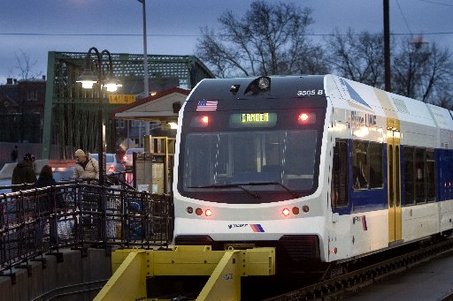New Jersey Future Blog
Real Estate Analyst Warns Suburban Land Use Regulations Driving People, Jobs Away
January 29th, 2014 by Nicholas Dickerson
In his keynote address at the New Jersey Chapter of the American Planning Association’s annual conference Jan. 24, real estate expert Jeffrey Otteau, president of the Otteau Valuation Group, issued a stern challenge to planners: Big changes to municipal land use regulations are needed, and they are needed now.
Historically, the demands of municipal budgets have pushed New Jersey municipalities to zone for and build millions of square feet of retail and office space. Why? Those uses bring property tax dollars in to local coffers and place low demand on services, while conventional wisdom says housing brings costly schoolchildren. As a result of shifts in the economy and market preferences, Otteau said, New Jersey is now left with a glut of aging suburban office parks, sprawling retail “towne centres,” and higher-density but age-restricted adult communities. How big a glut? According to Otteau’s projections based on the current rate of real estate absorption in New Jersey, it will take 11 years to utilize the existing supply of age-restricted housing. The existing supply of retail space is enough to meet demand until 2031, and our current supply of office space will meet our needs through 2043. (As a point of comparison, the vacancy rate for office space on the I-287 corridor is as high as 22.4 percent. The vacancy rate for office space in Detroit presently stands at 26.5 percent.)
On the other hand, Otteau said, New Jersey has six months’ supply of single-family housing and only 2.4 months’ supply of multi-family apartment housing available to meet demand. Additionally, the most recent economic recession, combined with high gas prices and job losses, has radically changed the contours of the state’s housing market. Lower wages now mean two earners are needed in order to afford housing in many parts of the state. Young adults have no interest in the large-lot suburban communities their parents preferred, and much less interest in homeownership than their parents did. These phenomena have generated heightened demand for smaller, more affordable residences, often in more urban areas where jobs and amenities are easily accessible.
This is exactly the kind of housing that is in the shortest supply in New Jersey, and the increase in demand has helped to put upward pressure on housing prices. As a result, prospective buyers and tenants are moving out of the market and businesses are uprooting from their suburban locations to higher-density urban environments. (While in some cases this means New York or Philadelphia, the 7.5 percent office vacancy rate in New Jersey’s urban areas stands in stark contrast to the 22.4 percent vacancy rate along the I-287 corridor that Otteau highlighted.)
The housing types that are presently in greatest demand are, as Otteau reminded the audience, difficult to provide in many New Jersey municipalities because of restrictive zoning regulations. If we’re going to address the problem going forward, Otteau stressed, New Jersey municipalities need to examine their land use regulations and try to find ways to enable the creation of more diverse housing types. Otherwise we will continue hemorrhaging jobs and young people. If municipal leaders really want meaningful economic growth, Otteau concluded, they need to respond quickly and effectively to changing market demand. If not, they risk becoming 21st-century ghost towns.


















Sounds a lot like what has happened on Long Island. Hopefully NJ leaders can be more accommodating.
Finally, someone is talking about building sustainable communities instead of empty retail space! Smart urban planning requires the ability to draw new families into New Jersey instead of driving them away, someone Detroit learned far too late. Excellent article!
So, land use controls are why the economy crashed, why there is record levels of extended unemployment, and why corporations are sitting on hundreds of billions of dollars of capital and not making investments in US?
Really?
What is the evidence that backs up that statement?
I didn’t find the explanation of need for New Jersey municipalities to examine their land use regulations and try to find ways to enable the creation of more diverse housing types to be very compelling. The demands of municipal budgets seems to be the big problem, and creating more diverse housing types isn’t going to help municipal budgets or property taxes. What is wrong with prospective buyers and tenants moving out of the market and businesses uprooting from their suburban locations to higher-density urban environments? Isn’t this a move towards equilibrium of unsustainable growth expectations and a more steady state economy? Suburban land use regulations are a result of the unsustainable costs of excessive growth, and changing them to promote more unsustainable growth is not good planning.
Agriculture, Open Space, Permeable Surfaces for Rainwater Recharge are just three land uses that can be more sustainable and less costly to suburban communities.
Many costs seem to be mandated by higher forms of government (county, state or federal) and are not in control of local officials.